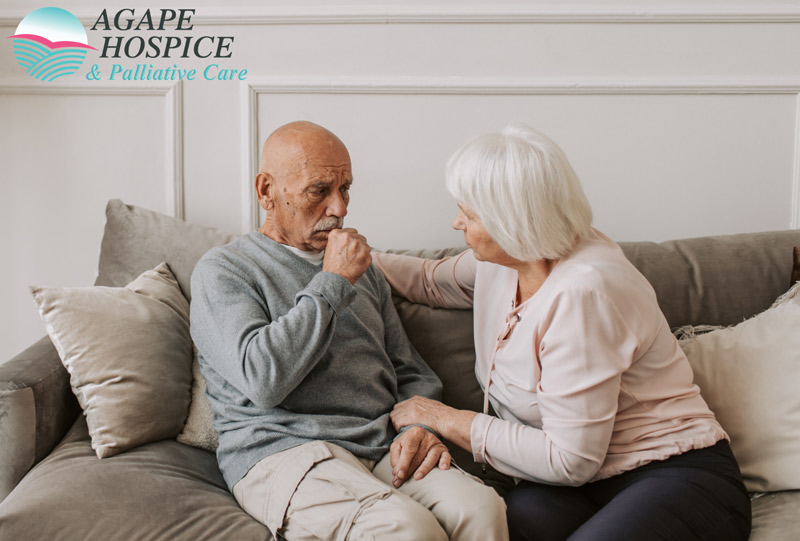What to Know About Pain Management During End-Of-Life Care
Hospice treatment focuses on pain management as a key goal. However, many individuals are misinformed about how hospice care handles pain, discomfort, and other end-of-life conditions or symptoms.
Hospice and palliative care prioritizes the comfort and well-being of the patient. Nurses, doctors, and other hospice healthcare professionals have a responsibility to alleviate suffering and pain in terminally ill patients.
“Few Things We Do for Patients Are More Fundamental to the Quality of Life Than Relieving Pain, Especially at the End of Life.”
– American Society for Pain Management Nursing and Hospice and Palliative Nurses Association
The goal of hospice is to improve the patient’s quality of life at every stage of their disease. This entails striking the correct balance between pain relief and the capacity to function. We make these decisions as a qualified hospice provider based on each patient’s unique needs and preferences.
Pain is a common problem with many people at the end-of-life and can actually accelerate the decline in health due to poor nutrition, depression, lack of social stimulation and lack of exercise. If severe enough, pain can prevent patients from performing common daily tasks.
Therefore, one of the primary aspects of hospice care is pain management – keeping the patient comfortable and managing symptoms so that they have the best quality of life possible for as long as they live. No one deserves to die in agony.
“Pain, which can be acute or chronic, or a mixture of the two, profoundly affects quality of life and contributes significantly to suffering. Pain is sensed by the nociceptive system, but is mediated centrally by a patient’s subjective perceptions and is therefore uniquely perceived by each individual, and will be affected negatively by other factors, especially at the end of life, all contributing to an overall sense of suffering. These cofactors include sleep deprivation, weakness and depression, breathlessness, gastro-intestinal symptoms such as nausea and vomiting, psycho-social factors including poor medical team coordination and communication, family worries and financial worries, to name a few.” (1)

But what if a terminal patient is unable to communicate their symptoms and level of pain? Such as those with Alzheimer’s Disease or other forms of dementia. How does hospice help reduce the severity of pain and suffering? Our compassionate hospice professionals have expertise in working with families to identify pain in these cases then co-managing the treatment.
Different types of pain require different medications. For example, consistent versus intermittent pain or determining if the pain is localized or radiates. Agape hospice nurses and doctors have extensive experience in assessing pain in patients who can’t articulate their level of discomfort in order to provide the best-suited pain management treatments and medications.
Of course, Agape Hospice & Palliative Care is Joint Commission Accredited. This means that we met The Joint Commission’s enhanced requirements that address critical patient safety and overall quality issues including staff competency, medication management, infection control, and patient education.
When it comes to hospice industry standards, the World Health Organization provides guidelines for treating pain in hospice patients including the ‘Pain Ladder’ and Hospice Pain Medication Protocol.
“Regular assessment for the presence of pain and response to pain management strategies should be high priority in terminally ill patients. Pain management interventions are most effective when treatments are individualized based on the various physical and nonphysical components of pain at the end of life, and patients and family are educated and involved in the decision-making. Opioids remain the cornerstone of pain management, and adjuvant analgesics and nonpharmacologic options are usually considered after relative stabilization of pain.” (2)
Another concern that the loved ones of a dying individual might have is that taking pain medications like opioids will accelerate their death. But actually, evidence suggests the exact opposite to be true. According to the American Hospice Foundation, studies have shown that when pain is well controlled with appropriate use of pain medications, including opiates, people live longer than those with the exact same condition whose pain is not well controlled.
Starting hospice care early on in the terminal diagnosis allows the individual to have their pain addressed swiftly, allowing them to get the most out of hospice care and therefore the most out of the time they have left. Terminally ill patients who receive hospice care survive longer once their symptoms have been managed.
This is why we believe strongly in promoting knowledge about dying and the end-of-life experience. When terminal patients are aware of their pain management options and that it is a priority in palliative care, more people can have a higher quality of life at the end of their lives. Death is inevitable but it does not have to be painful when there is relief and support available.
For support, please contact our Agape Hospice team.
Dealing with a terminal illness or watching a loved one suffer is physically and emotionally exhausting. Not only the anticipatory grief but also actually managing the realities of the illness and symptoms. Pain management for a dying person is a delicate and nuanced process that necessitates professional assistance to achieve the best possible quality of life during this final stage. If you or a loved one has been diagnosed with a terminal illness, don’t be afraid to seek help and explore options. Contact Agape Hospice to learn how our palliative services can improve the end-of-life experience.
Call us at 213-234-5535 or email us: info@agapehospicepc.org
